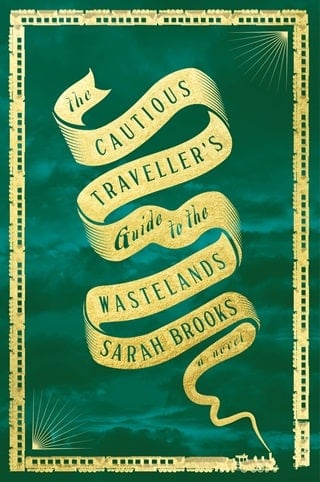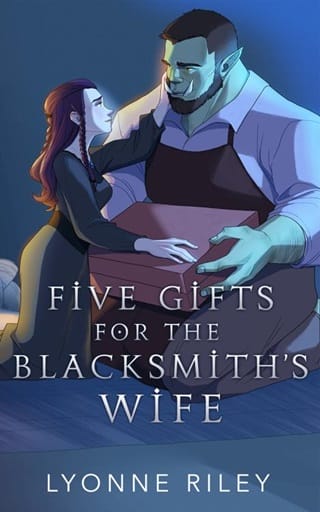8. Consequences
"I have heard it is the end for the Captain, you know." Guillaume speaks in the hushed, delighted tones of one starved of gossip.
"Well, she let it happen, didn't she?" says Wu Jinlu. "With all their boasts about the strongest train in the world, et cetera et cetera, he still managed to get out. Not so secure after all."
"Such hubris always comes before the fall," murmurs Galina Ivanovna, piously.
It is early evening. The rhythm of the train has resumed—dinner served on fine porcelain, wine poured by stewards wearing pristine white gloves. The atmosphere has lightened with the news that the water rationing is over, though Marya notices that the soup has largely gone uneaten. She dips her spoon into her bowl and for a moment she sees an oily sheen on the surface, a ripple of a color she cannot name.
The Countess inquires, "Has anyone seen our intrepid escapee?"
"Under observation by the doctor, I heard," says Wu. "Quarantined. He took his helmet off, it seems, and somehow ended up half-drowned in a swamp."
Galina Ivanovna shudders. "But how will they know if he is… if he has become, well, infected?"
"I presume it will become clear soon enough, and that the necessary measures will be taken," says Wu.
"These English fellows," says Guillaume, "I'm sure he'll not have picked anything up, they never do. Their miserable climate makes them immune."
"The girl went out as well, after him, you know," remarks Wu Jinlu. "The little train orphan. Not a thought for her own safety, I hear, really quite heroic."
"They're saying that Grey had some kind of breakdown, didn't know where he was or what he was doing," says the Countess, with relish.
"Poor man," says Guillaume. "They do say that some minds simply cannot cope with it." He looks satisfied that his mind is made of stronger stuff.
"And the creature," says the Countess. "Did you get a look at it? I can't help expecting to see it every time I glance outside." But her question is met with an uncomfortable silence. They don't want to remember, thinks Marya. They don't want to think about the sharp teeth, the mighty jaw. Easier to speak of Henry Grey and his human frailty.
"If the Captain is being punished for this lapse," Galina Ivanovna says, "what about Dr. Grey, then? Will he just come back after his quarantine? Are we to treat him as if nothing has happened?"
"I imagine that that is exactly what our two Company gentlemen would like," says the Countess. "The Trans-Siberia Company seems to put a high value on the virtue of forgetting."
The Company gentlemen have not appeared for dinner. Marya pictures them standing in their cabin, puzzlement changing into anger as they see the signs left behind by an uninvited guest; by a curious, incautious thief. She imagines them counting, calculating, trying to enumerate what is missing. Did she leave anything behind? Her appetite has deserted her, the wine tastes bitter on her tongue.
"Forgive me, I think I will return to my cabin a little early this evening," she says, setting aside her napkin and rising from the table. She needs to be away from the brittle chatter of First.
The gentlemen stand up with her.
"But you will be joining us later, won't you?" Anna Mikhailovna's tone suggests that this is less of a question than a command. "We need a fourth at bridge."
As Marya is searching for a suitably non-committal reply, the carriage door opens, and the Crows enter, in their habitual black suits, with their habitual blank expressions. "Yes, of course," she says. The Company men are watching her, their eyes shrewd. "I look forward to joining you." She begins to move away but the Crows block her path to the door.
"We hope you have not been too alarmed by today's events," says the Russian. "The safety and well-being of our passengers is of the utmost importance to us, as you know."
They both glance around to make sure the other passengers are listening. "And we can assure you that today's scientific expedition was carried out under the strictest of conditions, and that Dr. Grey's findings will be used to help our understanding of the Wastelands, thus making our journeys even safer for our passengers."
Marya realizes she is staring at them with her mouth open, and clamps her lips shut. She glances back at her table, and sees the Countess frowning.
Light is dawning on Guillaume's face. "Oh, so it was planned, was it? Well, I do think he might have told us in advance, to save us all worrying about him so much."
Marya imagines there had been very little worrying for Grey's safety, but the Crows are contorting their faces into expressions of contrition.
"Dr. Grey was insistent that nobody should know of his intended excursion. I am sure you know that he is a modest man, and he wanted neither an audience nor to give undue anxiety."
The Countess is raising her eyebrows, and there are other dubious looks among the passengers, but no one speaks until Galina Ivanovna announces, brightly, "Well, we have all said how much we admire his dedication to his work." There are a few slow nods of agreement.
It is like a spell,thinks Marya. Words transmuted into being. I say, therefore it is. Even so weak a story. Has no one thought to ask why Weiwei needed to bring him back, if it was really all planned? Have the Company gentlemen come to believe it themselves, convinced that whatever lie they tell is the truth? This is the power the Company has. How dare they? She can feel the words clawing at her throat. Liars! How they hide behind their neat black suits, their smooth, reassuring words. She wants to scratch off the veneer, to expose the rot within. Her head swims and she can see the Countess looking at her in concern but there is nothing she can do; she will be sick if she does not speak—
"May I accompany you back? Perhaps I can show you the book you were asking about?"
Marya spins around to see Suzuki, a hand hovering at her elbow, and she tenses. She hasn't wanted to face him; hasn't wanted to ask him all the questions she has.
"The history of the train, that I had mentioned? I have found it in the library and asked the steward to set it aside for you." He is guiding her gently but firmly to the door. "I believe you will find it a fascinating read."
They are halfway down the sleeping carriage before she trusts herself to speak. "There was no need—" she begins.
"In that case, I offer my apologies for my misreading, for I thought you were about to reveal to our Company friends and the whole of First Class just who you really are."
There is a long moment of silence between them.
"I am right, am I not, Marya Antonovna Fyodorova?"
A ringing begins in her ears. It has been so long since she has heard her real name. She had thought, after their last meeting, that he must know, but she had not wanted to examine the thought too closely. She had not wanted to think about him at all. "How did you know?" she asks, eventually.
The look he gives her is half-amused, half-disbelieving. "All those questions you asked, the telescope that you knew how to use… You may not have a high opinion of me, but I am not stupid." She flushes, but he goes on. "And I thought, of course… Of course Anton Ivanovich's daughter would come to find out the truth."
"The truth," she says, trying to keep her voice steady. "And what truth is this?"
Suzuki glances back down the corridor. "Come," he says. "It will be better if we maintain our fiction." He leads her into the library car, where a steward is dozing in a corner, though he sits up to attention when they enter. Suzuki whispers something in the man's ear, who gives a grin and hurries out of the carriage, casting a look at Marya on his way.
"Better to be the subject of crew gossip than to raise the suspicions of the Crows any further," says Suzuki, though he doesn't meet her eye. He goes to one of the bookcases and takes out a heavy volume, which he opens on a table, turning on the reading light above it. "Perhaps you would like a seat?" he says. She notices that there are dark smudges beneath his eyes and although his expression is calm, his long fingers fidget at his shirtsleeves, pulling them further down over his hands. His awkwardness makes her feel self-conscious. "I am fine to stand, thank you," she says, and she will not help him more than this, she will harden her heart to the pain she sees on his face.
"Ask me," he says. "Ask me your questions and I will give you what truths I can."
"Truths that I shouldn't have to find for myself," she says, and he flinches as if she has slapped him. She says, "Is it true that the glass was flawed?"
"No," he says, "it is not true," and reaches out to touch the window, as if touching the icon of a saint. The reverence of the gesture makes Marya's breath catch in her throat. Then he goes on, his fingertips still on the window, "It cracked, of course."
The lightness that Marya had begun to feel comes crashing down. "But—"
"It cracked and there was the answer the Company wanted to that impossible question, What went wrong? An easy answer, it must have made them breathe a sigh of relief—the glass cracked, everyone could see it—a window in Third. That was what caused it all, the hysteria, the memory loss. Never mind that your father had warned the Company that we were making too many crossings; never mind that the glass needed to be replaced more often if we were going to push the train to such speeds, with such frequency—here was their answer and their solution; the fault was with the glass and the glassmaker, they let the outside in."
He is angry,she realizes. Angry at the Company, angry at himself, and somehow his anger helps to ease some of her own rage. "Then why do you say that the glass was not to blame?"
He takes his hand from the window, as if only just realizing what he is doing. "Because the changes had already begun."
She stares at him. "What do you mean?"
She lets the silence between them spool out. She listens to the sounds of the rail and the ticking of the clock on the wall.
And Suzuki begins to speak.
"Your father and I shared an interest," he says, "in mapping the Wastelands, in observing as closely as we could every change, however small. We wanted to see closer and closer. Your father developed lenses that built on the work being done in astronomy, but instead of looking into the night sky he let us look into the world around us."
"I know all this. The telescope in your tower, the prototype… It consumed him, the idea that he could get close enough to see how the petals of a flower were made, the building blocks of life, he said. And they took that away from him, your Company. All of you. If he had had more time, he could have made it work, there was so much else he could have done."
But Suzuki is shaking his head, and before she can ask him how dare he try to contradict her, he says, "But he did do it. The prototype worked."
She tries to grasp what he is saying, how it all fits together. "But you said it was faulty…" Though there had been something in his voice, up there in the tower. Fear, she thinks.
"It worked better than we could possibly have imagined but in ways we couldn't understand. That we didn't understand, until—" He stops, and she can see him putting his thoughts in order, as carefully as he orders his maps. "When we tested the lenses in Beijing, we saw the most extraordinary detail. Through a scope small enough to carry up a flight of stairs, we could count the tiles on a rooftop a mile away. But when we used it in the Wastelands, we saw—" He shakes his head. "We saw veins running through every living thing, connecting one to another, like threads… it is hard to explain… but it was as if we were seeing a tapestry and the reverse of the tapestry at the same time—the pattern and how the pattern is made. Does it make sense? No, I am sure it does not…"
What I have seen weighs on my mind more heavily day by day, her father's letter had said. What he saw had convinced him the train must stop.
"Go on," Marya says.
"It was the most astonishing breakthrough. Crossing from Beijing to Moscow, we could hardly bear to take our eyes from the scope. We hypothesized at first that it could be a localized effect, a particular regional change that we had simply never been able to observe before, but we soon realized that the threads, the veins—we each had our preferred term—stretched through the whole of the Wastelands, connecting everything. And we realized too that we could follow the pattern of changes as they were made—we could watch as a spiral in the heart of a flower was drawn in the air by a flock of birds; how the order of markings on an insect's wing was mimicked in the fruiting body of a mushroom."
She can imagine her father's joy. "They are windows, all of them," he had said, holding up the lenses of a telescope for her to see. How proud he must have been.
"And we saw the train too," Suzuki goes on. "We saw the train in the patterns—its shape repeated in the leaves, the rail running through the bark of trees. We saw wheels in the lichen that covered the rocks."
"Those creatures," says Marya, slowly. "The worms, or whatever they were, they seemed to be mimicking the train."
Suzuki nods. "As we are observing, we are being observed in turn."
"It made my father afraid. I found the letter that he wrote to the Company… You knew I would, didn't you? You knew it was in the Crows' cabin."
"As soon as we reached Moscow, he insisted on sharing our findings with the Company Board. We had proof, he said, that the land is learning, that what we have always feared—the unpredictability of the changes, their random nature—is not the true danger at all. What is dangerous is that there is meaning, intent behind them, and we can see it now with our own eyes."
"The pattern and how the pattern is made," Marya whispers.
"I tried to dissuade him," Suzuki goes on. "To my shame, I refused to put my name to his letter. I argued that we needed more time to understand what we were seeing, and when we received no response from the Company in Moscow, I was relieved." He closes his eyes. "And then, on the crossing back to Beijing—that last crossing—as soon as we passed through the Wall we saw again the patterns outside, but this time we saw them inside as well. In the train itself. We saw the outline of ferns in the wood paneling, the patterns of water in the cloth of the curtains. We started to doubt our own sanity, the evidence of our own eyes, and then…" He stops. "And then it goes dark. Whatever had happened, it vanished from our memory. When we came back to ourselves, we had reached the Beijing Wall and the glass had cracked. There was no sign of any of the things we had seen. And your father…" His voice breaks. "Your father blamed himself. He was too ready to take responsibility for the glass, to dismiss what we had seen in favor of what the Company called the most obvious explanation."
"Then why did you stay silent? It ruined him, the loss of his reputation, his livelihood. It killed him."
Grief suffuses his face and he holds on to the back of the chair as if he cannot keep himself from falling. "Because I am a coward. Because the train is all I have and if the doors to the Wastelands close for good, then I am left with nothing. The moment I left Japan I became a man of no country and became a Company man instead, a man of the train. Without it I belong nowhere. I was not strong enough… Not selfless enough to bear the thought that what we had discovered could lead to the destruction of the Company."
"It should be destroyed. It has put us all in danger—you have put us in danger."
He looks utterly defeated. "I have tried to convince myself that we were wrong, that what we saw was a Wastelands trick; that the walls of the train are as strong as the Company boasts. I have locked away the new telescope. I have forced myself not to see, though it has been seeing, observing, that has given my life meaning."
She tries to steady the shaking in her legs. She doesn't know if it is sadness or anger or something else, something too complicated to put a name to, too big to try and grasp while standing here, in this dimly lit carriage, on these unfamiliar rails.
"And you are trying to atone," she says, quietly.
 Fullepub
Fullepub 



